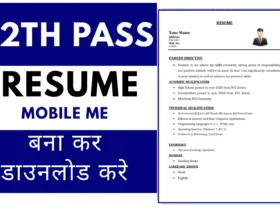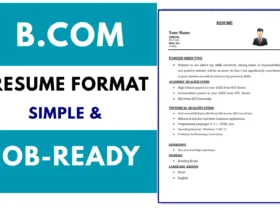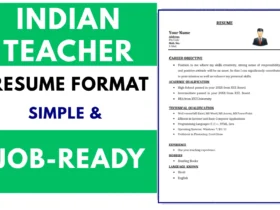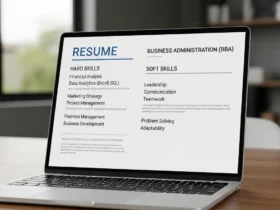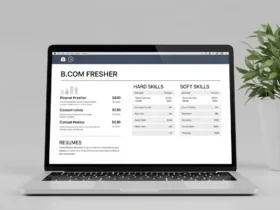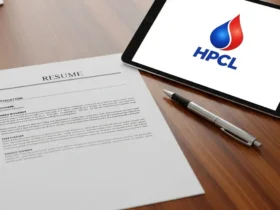Think about the exciting time right after you finish your M.Sc. Chemistry studies. It is a big step, a real moment of pride, not just for you but for your whole family. Now, you are looking for your very first job. This paper, your “job application” or resume, is like your first friendly hello to a company. It tells them who you are, what you have learned, and what you can do.
In India, families put a lot of hope into higher studies, dreaming of good career paths for their children. Your M.Sc. degree is a big step, and this job paper helps show that you are ready to take on the world. The job market here has many talented people, so a good MSC Chemistry Resume helps you stand out. This guide will show you how to make your MSC Chemistry Resume in India shine brightly, giving you some good M.Sc. chemistry resume tips.
What makes a resume good for chemistry jobs in India
So, what makes a good resume for an M.Sc. Chemistry fresher in India? The main idea is to keep it short and to the point. Often, one page is best. It should be clean, clear, and easy for anyone to read. Imagine someone looking at many papers; yours should be easy on their eyes. This is the best resume style for M.Sc. chemistry graduates.
Resume should have a few main parts. First, your contact details, so companies can reach you. Then, a small note about what job you are looking for. After that, list your education details, starting with your M.Sc. degree. Next, show the skills you have learned, especially those from lab work. Finally, talk about any big projects you worked on during your studies. This answers what to include in M.Sc. chemistry fresher resume. Think of how we present any important documents in India – they should always be neat and clear. Doing this shows you are serious and careful, which are qualities companies like to see.
Sample MSC Chemistry Resume Format (Easy to Copy)

👉 Download Link: [Get Here]
You can:
- Fill it in Adobe or any PDF app
- Print it on clean A4 paper
Applying and Interviewing
Your resume gets you in the door, but the next steps are just as important
Crafting a Cover Letter that Connects
Always write a cover letter with your resume unless the application states otherwise. It is your chance to explain why you are a good match for this specific company and this specific job. Do not just repeat what is in your resume. Use it to tell a short story about your interest and how your skills connect with their needs.
Indian Insight: Write a polite and well-structured letter. Try to address it to a specific person if you know their name and title. Show your true enthusiasm and a respectful attitude (“vinamrata”). A well-written cover letter shows your communication skills and seriousness about the opportunity.
Getting Ready for Interviews: Common Questions and Tips
When you get an interview call, it is time to prepare thoroughly.
- General Questions: Be ready for common questions like “Tell me about yourself,” “Why do you want to work for this company?”, “What are your strengths and areas for improvement?” Practice answering these so you feel confident.
- Chemistry Questions: Review basic chemistry concepts from your MSC degree. Be prepared to discuss topics like molality, titration, buffers, chemical reactions, and the principles of various lab instruments you listed (like HPLC, GC-MS, or NMR). Think about safety rules in the lab and how you would apply them.
Indian Insight: Dress smartly and professionally for the interview. First impressions matter. Show respect to the interviewer by listening carefully and answering thoughtfully. A confident but humble approach is usually well-received. Researching the company beforehand shows you are serious and dedicated to the opportunity.
Understanding the Indian Chemistry Job Market
The chemistry job market in India is changing rapidly. It is growing fast, especially in sectors like pharmaceuticals, specialty chemicals, and research and development (R&D). You can find openings in private companies, government labs (like CSIR, BARC, DRDO), and public sector companies.
- Challenges: Competition can be high, particularly for sought-after government jobs. Sometimes, what you learned in college might not perfectly align with what a company needs today. So, learning new skills (like digital tools for data analysis or modern green chemistry practices) is helpful. Initial salaries for freshers might seem low, but they typically grow well with experience and added skills.
- Growth Ahead: India’s chemical and pharma industries are set for big growth in the coming years. This means more opportunities for chemists who are keen to learn and adapt to new technologies and sustainable methods. Cities like Hyderabad, Mumbai, Ahmedabad, and Pune often have more jobs in this field because they are hubs for these industries. Expanding your knowledge beyond basic theory will give you an edge.
Conclusion
To sum up, your job paper is very important. It is your chance to make a good first impression. Keep it clear, true to what you have done. This MSC Chemistry Resume is your chance to show what you can bring to a company, from your knowledge to your lab skills.
Believe in your studies and your skills. Remember the spirit of “never give up” (koshish karte raho) that is taught in many Indian homes. Your hard work in getting your M.Sc. degree will pay off, and a well-made job resume is your first step towards a good career.
FAQ
Do I really need to put a photo on my resume in India?
Yes, it is quite common and often expected by Indian recruiters. Make sure it is a professional, passport-style photo where you look neat and presentable.
Is a one-page resume enough for an MSC Chemistry fresher?
Absolutely. For freshers, recruiters prefer a concise, one-page resume that quickly highlights your most relevant qualifications and experiences without overwhelming them with too much detail.
What if I do not have much formal job experience?
Focus on your academic research projects, extensive lab work during your degree, any internships (paid or unpaid), and volunteer roles. Describe your specific role, the skills you used, and what you learned from these experiences. Quantify your contributions when possible.

